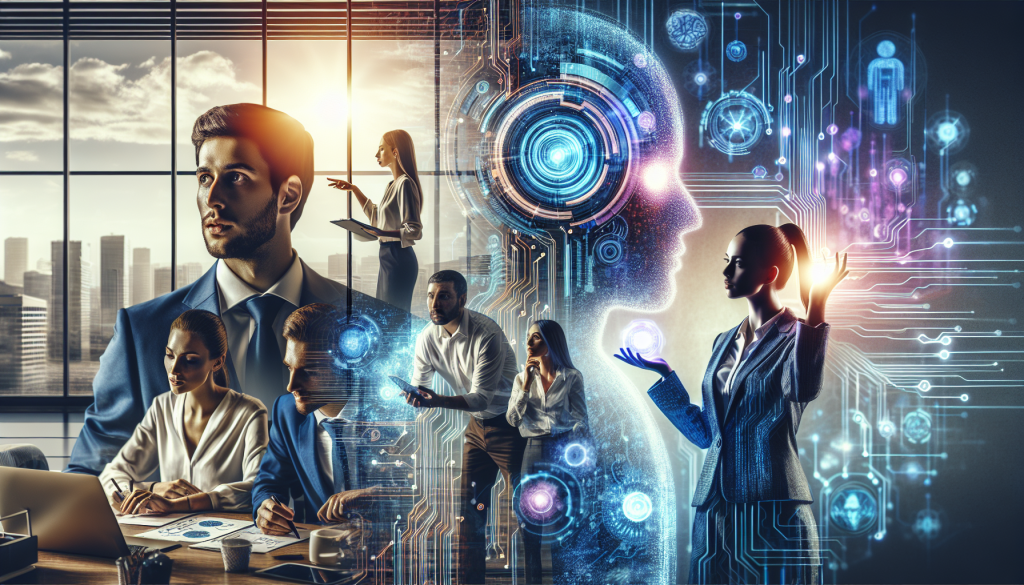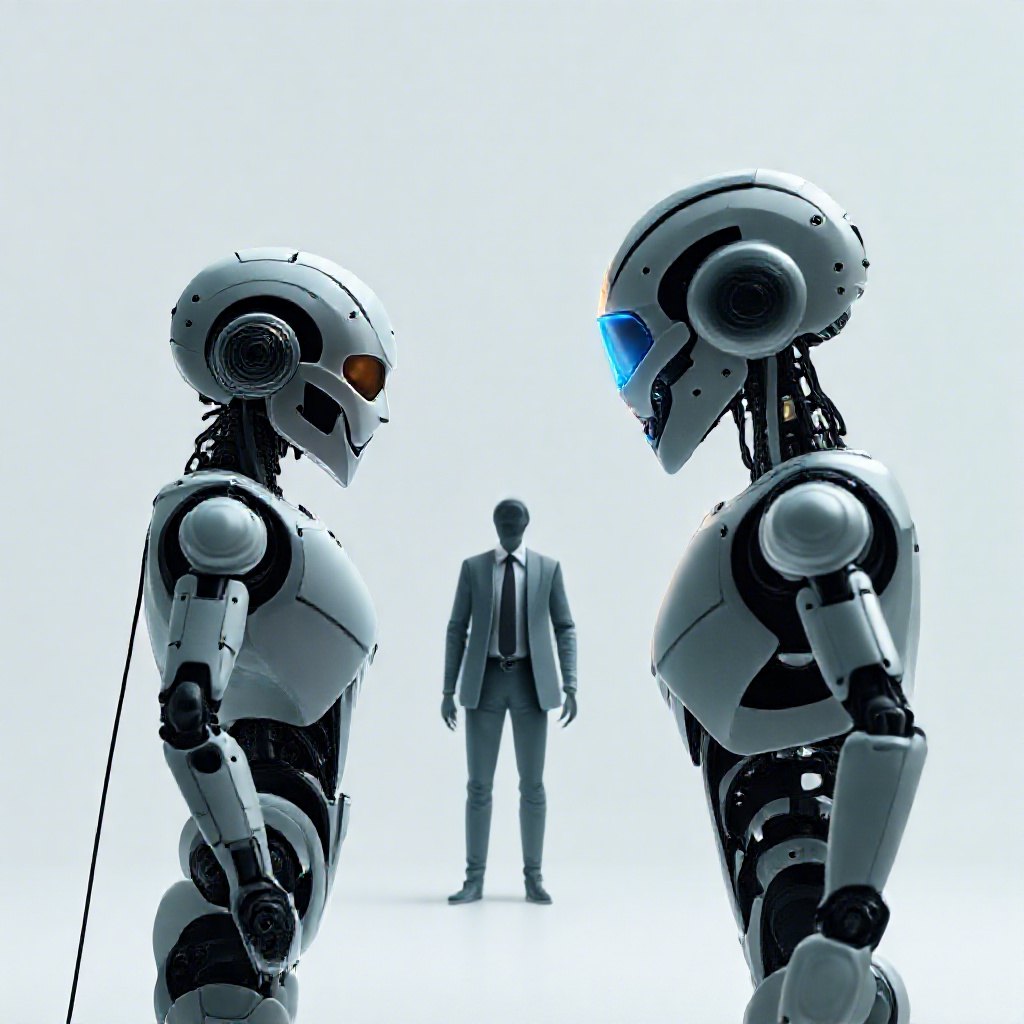What is this universal basic income really about? It’s a hot topic these days, especially as we’re seeing big changes in how we work and earn money. I’ve been diving deep into this idea, and let me tell you, it’s pretty fascinating stuff. Universal basic income, or UBI for short, is this concept where everyone gets a regular chunk of cash from the government, no strings attached. It’s got people talking about how we might tackle income inequality and shake up our whole economic system.
Now, here’s where things get really interesting. We’re going to explore how UBI connects with the world of computing and AI. I’ll break down what UBI actually means and why it’s gaining traction. We’ll also look at how artificial intelligence and automation are changing the job market. Then, we’ll dive into this new idea called “universal basic compute” – it’s like UBI, but for computer power. Finally, we’ll chat about what the future of work might look like in an economy driven by AI. It’s mind-bending stuff, but I promise to keep it down-to-earth and easy to follow. Ready to jump in?
The Concept of Universal Basic Income
Hey there! Let’s dive into this fascinating idea of universal basic income (UBI). It’s a concept that’s been making waves lately, and I’m excited to break it down for you.
Definition and Origins
So, what exactly is UBI? Well, it’s a social service model where every citizen gets a small monthly or annual stipend from the government 1. The cool thing is, you get this money regardless of whether you have a job or how much you earn. It’s like a financial floor for everyone to stand on.
Now, you might think this is a new idea, but it’s been around for centuries. Thomas Paine, one of the guys who helped spark the American Revolution, was talking about something similar way back in the 1790s 2. And get this – it was actually an English writer named Thomas Spence who first outlined a complete basic income proposal in 1797 3. Talk about being ahead of your time!
Current Implementations
Now, you might be wondering if any countries have actually tried this out. As of early 2022, no country had fully implemented a UBI system 1. But don’t worry, there have been some interesting experiments!
Take Finland, for example. In 2016, they gave 2,000 randomly selected unemployed citizens 560 euros (about $640) every month 1. The result? People reported being happier and healthier. Plus, they loved not having to deal with all the paperwork that usually comes with unemployment benefits.
Potential Benefits
So, why are people so excited about UBI? Well, there are quite a few potential upsides:
- Poverty Reduction: UBI could help bring everyone’s income above the poverty line 4.
- Worker Empowerment: It could give employees more bargaining power. As Annie Lowrey put it, “Why take a crummy job for 7.25 an hour when you have a guaranteed 1,000 dollars a month to fall back on?” 4
- Economic Equality: It could help balance out the growing wealth gap in high-income countries 4.
- Safety Net for Automation: As technology takes over more jobs, UBI could act as a security net for those left jobless 4.
- Support for Caregivers: It could allow people to care for ill or differently abled relatives without having to quit their jobs 4.
Elon Musk: “Why not Universal High Income?”
Now, here’s where things get really interesting. Elon Musk, the guy behind Tesla and SpaceX, has been talking a lot about UBI. He sees it as a necessary response to automation taking over human jobs 5.
But Musk doesn’t just stop at basic income. He’s thinking bigger. He predicts we’ll end up with a “universal high income” 5. Imagine that – a future where everyone has not just enough to get by, but enough to live comfortably!
Musk believes that as AI takes over most jobs, we’ll have no choice but to implement some form of UBI 5. He sees a future where productivity is so high that everyone can have whatever goods and services they want 5.
But here’s the kicker – Musk also points out that in this AI-driven future, we might struggle to find meaning in our lives if work becomes optional 5. It’s a mind-bending thought, isn’t it?
So there you have it – the concept of UBI in a nutshell. It’s a big idea with the potential to reshape our society. What do you think? Could UBI be the solution to some of our biggest economic challenges? Or is it too good to be true? It’s definitely something to ponder!
The Rise of Artificial Intelligence and Automation
Hey there! Let’s dive into the exciting world of AI and automation. It’s like we’re on the brink of a tech revolution that could change everything about how we work and live. Pretty wild, right?
Impact on Job Market
So, here’s the deal: AI and automation are shaking things up in the job market big time. Get this – almost 40% of jobs worldwide could be affected by AI 6. That’s huge! And here’s where it gets interesting: it’s not just the routine jobs that are at risk anymore. AI is smart enough to tackle high-skilled jobs too 6.
Now, don’t panic just yet. In advanced economies, about 60% of jobs might feel the AI impact 6. But it’s not all doom and gloom. About half of these jobs could actually benefit from AI, boosting productivity. The other half? Well, they might see some changes in wages or hiring 6.
But here’s the kicker: some jobs are more at risk than others. Think about folks in finance, media, legal services, and even some computer programmers 7. On the flip side, jobs that need that human touch – like teachers, nurses, and social workers – are likely to stick around 7.
AI’s Role in Productivity Increase
Now, let’s talk about the good stuff. AI could be a game-changer for productivity. Remember how productivity growth has been kinda slow lately, at about 1.5% per year 8? Well, AI might just be the boost we need.
There’s some cool evidence showing that AI can help less-skilled employees up their game. For example, it’s been helping customer support agents, software developers, and mid-level pros do their jobs better 8. And get this – AI is even helping scientists make breakthroughs in areas like fusion reactors and protein folding 8. How cool is that?
But here’s the thing: while AI is making waves now, most of its effects are still to come. Some experts are comparing AI to past game-changers like electric motors and personal computers 8. If AI follows a similar path, we could be in for some serious productivity improvements down the line.
Potential for Mass Unemployment
Okay, I know what you’re thinking. “But what about all the jobs that might disappear?” It’s a valid concern. Some big companies are already cutting jobs that could be replaced by AI. BT, for example, is planning to cut up to 55,000 jobs by 2030, with about 10,000 potentially replaced by AI 9.
But before we freak out, let’s take a step back. Throughout history, jobs have always changed and evolved. Remember typists? That job nearly went extinct, but it paved the way for web designers and graphic designers 9.
The key is to adapt. As AI takes over some tasks, we’ll need to focus on skills that machines can’t easily replicate. Things like analytical thinking, complex problem-solving, creativity, and leadership 7. These are the skills that’ll help us stay relevant in an AI-driven world.
So, while there are challenges ahead, there’s also a lot to be excited about. AI has the potential to create new job opportunities we can’t even imagine yet. The future of work might look different, but it could also be pretty awesome if we play our cards right.
Universal Basic Compute: A New Paradigm
Hey there! Let’s dive into this exciting new concept that’s shaking up the world of universal basic income. It’s called Universal Basic Compute (UBC), and it’s got some pretty interesting twists.
Sam Altman’s Proposal
So, you know Sam Altman, right? The big boss at OpenAI? Well, he’s come up with this wild idea that’s got everyone talking. Instead of handing out cash like traditional UBI, he’s suggesting we give everyone a slice of computing power 10. Specifically, he wants to share the mighty processing capabilities of GPT-7, OpenAI’s super-smart language model.
Now, you might be wondering, “What the heck am I supposed to do with computing power?” Well, Altman’s got some ideas about that too. He thinks people could use their share to tackle tasks, learn new stuff, or even create cool things 10. And get this – if you’re not into using it yourself, you could sell your share to someone who needs more computing juice, or even donate it to important causes like cancer research 10.
Differences from Traditional UBI
So, how’s this different from the UBI we’ve been hearing about? Well, for starters, it’s not money in your pocket. It’s more like a productivity boost that you can use in different ways 10. Altman believes this approach could be more helpful in the long run, giving folks new opportunities to learn, create, and contribute to society 10.
It’s a pretty radical shift from the cash-based UBI experiments we’ve seen. Remember that study in Illinois and Texas where people got $1,000 a month 11? Well, this is a whole different ballgame.
Potential Implementation Challenges
Now, I know what you’re thinking – this sounds cool, but how would it actually work? And you’re right to ask. There are some pretty big hurdles to figure out.
For one, how do we divide up this computing power fairly? 10 It’s not as straightforward as splitting up cash. Then there’s the question of access – how would people actually use their share? 10 And let’s not forget about the job market – how would this impact employment? 10
These are all valid concerns, and to be honest, we don’t have all the answers yet. UBC is still a fresh idea, and there’s a lot of work to be done to figure out how it could actually be implemented.
But here’s the thing – it’s got people thinking and talking about new ways to address inequality and prepare for a future where AI plays a bigger role in our lives. And that, my friend, is pretty exciting stuff.
The Future of Work in an AI-Driven Economy
Hey there! Let’s chat about how AI is shaking up the job market. It’s like we’re on a rollercoaster ride, and things are changing fast!
Shifting Job Landscape
So, here’s the deal: AI and automation are totally transforming how we work. It’s not just a small change; we’re talking about a massive shift! The World Economic Forum’s got some eye-opening numbers for us. By 2025, they reckon about 85 million jobs might disappear due to automation 12. But hold on, don’t panic! They also predict that a whopping 97 million new roles could pop up 12. It’s like we’re playing job market musical chairs!
Now, you might be wondering, “What kind of jobs are we talking about?” Well, it’s not just tech jobs. AI is stirring things up in all sorts of industries. Think healthcare, finance, marketing, education – you name it! 13 For example, in healthcare, we might see a million new jobs thanks to AI 14. How cool is that?
New Opportunities in AI and Computing
Let’s talk about the exciting part – new job opportunities! The demand for AI specialists is through the roof. LinkedIn’s 2020 Emerging Jobs Report shows a 74% annual increase in job listings for AI-related roles 14. We’re talking about jobs like machine learning engineers, data scientists, and AI researchers.
But it’s not just about creating AI; it’s about working with it too. We’re seeing new roles pop up like:
- AI operators and trainers
- Data engineers
- AI integration specialists
- AI compliance officers
- AI ethicists 15
And get this – there’s even a growing need for writers and influencers to create content for AI systems to learn from 15. It’s like being an influencer, but for robots!
Reskilling and Education Needs
Now, here’s the kicker – to keep up with all these changes, we need to level up our skills big time. It’s not just about learning new tech stuff; we need to focus on uniquely human skills too. Things like creativity, critical thinking, and emotional intelligence are going to be super important 12.
Companies are stepping up to help. Microsoft, for example, has started global skills programs to teach digital skills to millions of people 14. But it’s not just up to big companies. We all need to embrace lifelong learning. The days of learning everything you need to know in school are long gone!
Educational institutions are getting in on the action too. They’re starting to include AI literacy in their courses, and not just in computer science departments 14. It’s about preparing everyone for an AI-driven world.
So, what do you think? Exciting times ahead, right? The future of work with AI is going to be wild, but if we stay adaptable and keep learning, we’ll be ready for whatever comes our way!
Conclusion
As we wrap up our journey through the fascinating world of Universal Basic Income and its connection to computing, it’s clear that we’re on the brink of a major shift in how we think about work and income. The rise of AI and automation is having a profound impact on our job market, pushing us to rethink traditional economic models. Universal Basic Compute offers an intriguing twist on UBI, suggesting a future where access to computing power could be as vital as financial support.
Looking ahead, the future of work in an AI-driven economy promises both challenges and exciting opportunities. As we navigate these changes, it’s crucial to stay adaptable and keep learning. To dive deeper into the world of AI and its potential, check out my AI Startup School course and its application project Otonom Fund, a blockchain launchpad and accelerator for AI startups. Whether you’re an entrepreneur, a job seeker, or simply curious about the future, embracing these new ideas and technologies will be key to thriving in our rapidly evolving world.
References
[1] – https://worldpopulationreview.com/country-rankings/countries-with-universal-basic-income[2] – https://www.investopedia.com/terms/b/basic-income.asp
[3] – https://en.wikipedia.org/wiki/Universal_basic_income_around_the_world
[4] – https://www.penguin.co.uk/articles/2021/02/universal-basic-income-pros-cons
[5] – https://www.businessinsider.com/elon-musk-universal-basic-income-ubi-ai-automation-unemployment-quotes-2024-6
[6] – https://www.imf.org/en/Blogs/Articles/2024/01/14/ai-will-transform-the-global-economy-lets-make-sure-it-benefits-humanity
[7] – https://onlinedegrees.sandiego.edu/ai-impact-on-job-market/
[8] – https://www.brookings.edu/articles/how-will-ai-affect-productivity/
[9] – https://www.theguardian.com/commentisfree/2023/may/22/ai-jobs-policies
[10] – https://www.linkedin.com/pulse/universal-basic-compute-instead-income-vaikunthan-rajaratnam-urmpc
[11] – https://observer.com/2024/07/sam-altman-vision-universal-basic-income-taking-shape/
[12] – https://www.linkedin.com/pulse/future-work-reskilling-upskilling-ai-driven-workforce-kambhampati-hhpre
[13] – https://www.reworked.co/learning-development/both-upskilling-and-reskilling-are-critical-in-the-ai-driven-workplace/
[14] – https://www.forbes.com/councils/forbestechcouncil/2024/03/12/the-future-of-work-embracing-ais-job-creation-potential/
[15] – https://www.forbes.com/councils/forbestechcouncil/2023/07/06/20-new-and-enhanced-roles-ai-could-create/
A Note on AI Assistance
This blog post was crafted with the assistance of AI, under my careful direction and editorial supervision. As an author, I believe in embracing innovative tools to enhance the quality, depth, and speed of my research, while maintaining the highest standards of integrity and originality. Consider it similar to the relationship between a professor and a PhD candidate doing research under his guidance. Please also bear in mind that the solutions I use are specifically trained with “my style”, based on my older writings, so they are not generic LLMs. They are model-agnostic as well, meaning, I am not bound by the output of any specific LLM and its flaws.
Here’s what you should know:
- Topic Selection & Direction: The themes, ideas, and overall direction of this post are entirely my own. AI serves as a tool to help articulate and expand upon my concepts.
- Editorial Oversight: Every word has been reviewed, edited, and approved by me. The final content reflects my voice, opinions, and expertise.
- Quality Assurance: I’ve ensured that all information presented is accurate, relevant, and valuable to you, my readers.
- Ethical Use: My use of AI aligns with generally accepted ethical principles and policies in content creation. I’m committed to transparency about its involvement in my writing process.
- Original Insights: While AI assists in articulation, the unique perspectives, analyses, and conclusions in this post stem from my personal knowledge and experience.
- The Future of Writing: I believe that this collaborative approach between human creativity and AI assistance represents the future of content creation, allowing for richer, more comprehensive explorations of topics.
- Continuous Improvement: I’m constantly refining my process to ensure that AI enhances, rather than replaces, my authorial voice and expertise.
I’m excited to use these cutting-edge tools to bring you high-quality, insightful content. If you have any questions about my writing process or the use of AI in this post, please don’t hesitate to reach out.
Thank you for your readership and support as we navigate this exciting new frontier in AI-augmented life together!




